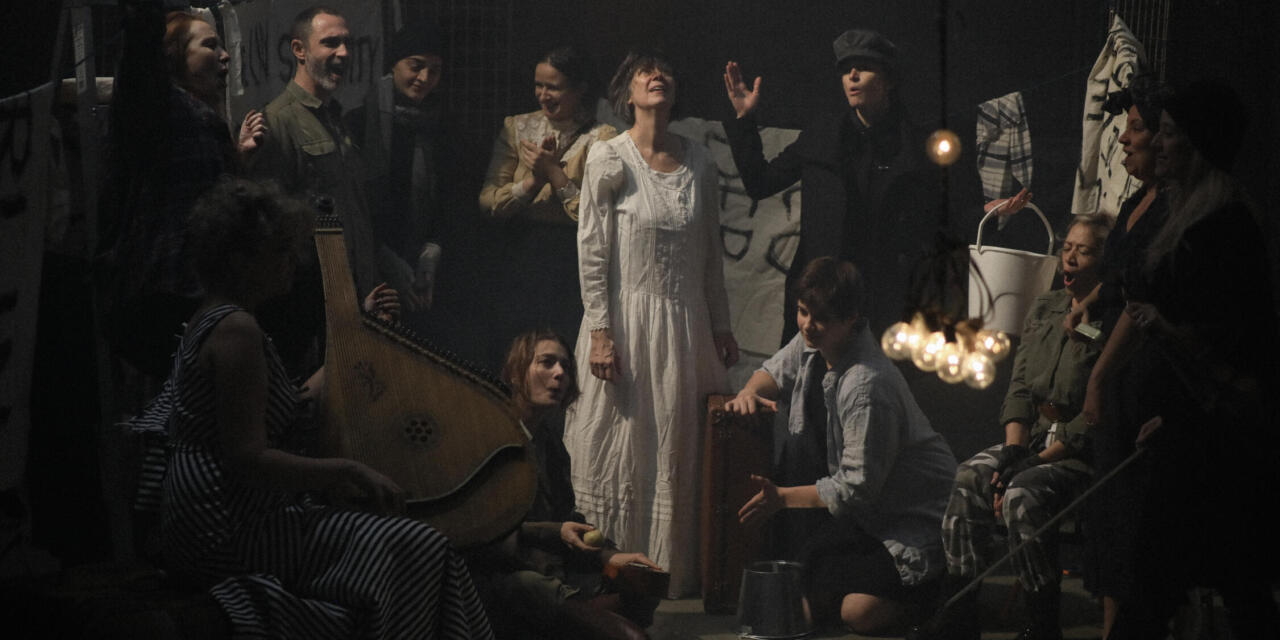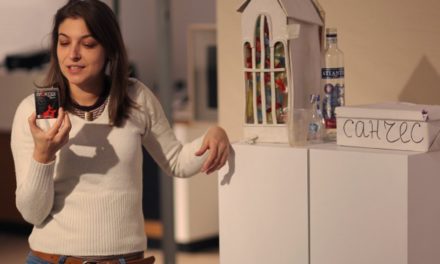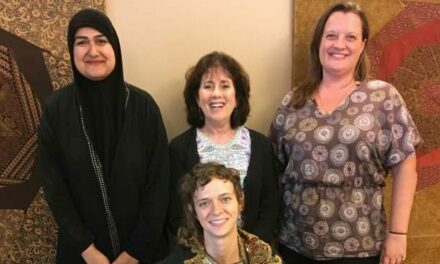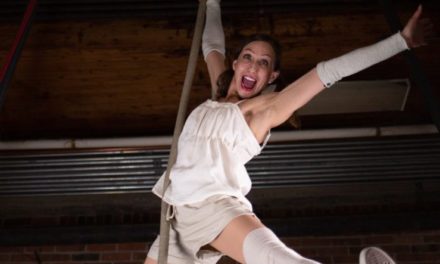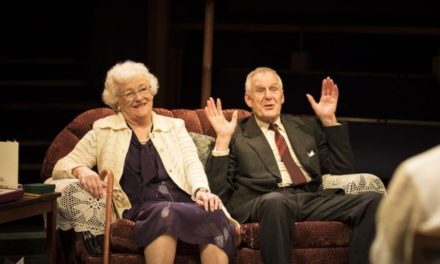Entering the theatre at HERE Arts, there is already a sense of broken ground. My companion and I find ourselves facing a half-built theatrical set, upstage canvas sign proclaiming “THEATRE SHELTER;” a woman dressed in dark clothing leans against the back of the center column, another finds herself perched on a skeletal wooden structure. It is as if entering the underground: one gains a sense of intimacy and isolation with equal intensity.
We sit in our seats—risers that feel a part of the actors’ environment—and wait, not long, for the lights to dim. (beyond) Doomsday Scrolling begins slowly, a woman (Kathryn Mederos Syssoyeva) pulling on shoes and grabbing a packed bag; over the simple ceremony plays the words of Bertolt Brecht’s The Jewish Wife, about a Jewish woman fleeing the Nazis. With a dance-like flourish from Syssoyeva, musician Lesya Verba takes center stage, balances her bandura, and sings the most haunting of Ukrainian folk songs.
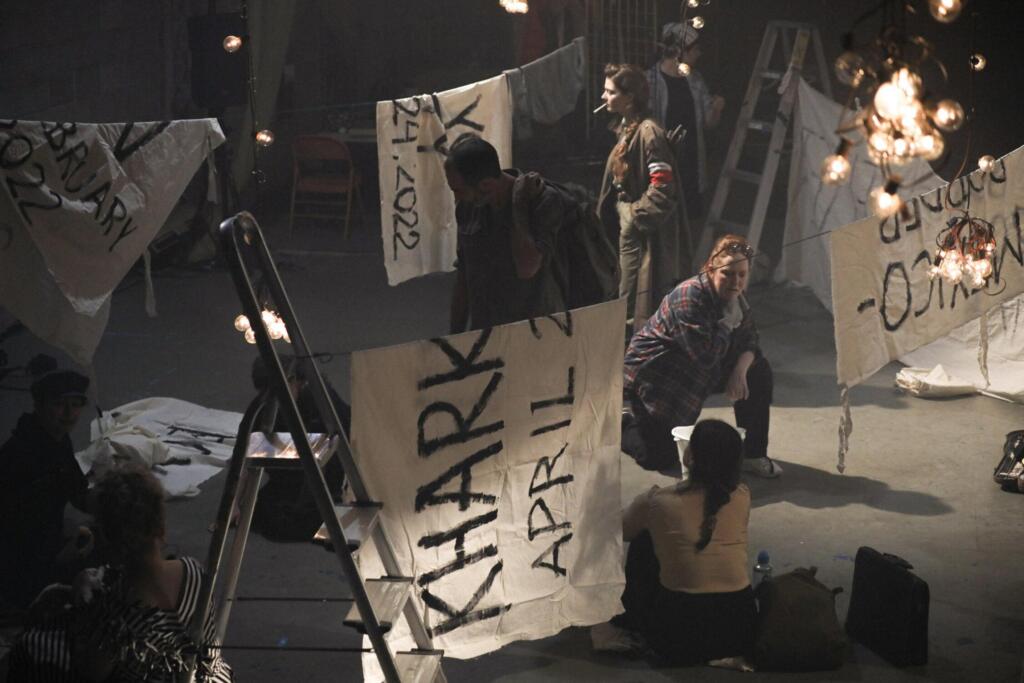
AnomalousCo’s “(beyond) Doomsday Scrolling.” PC: Jarrett Robertson
It is here that an incredible implosion takes place. Women stream into this makeshift shelter, arriving from wars in the Ukraine, Moldova, Georgia, Scotland, Germany, Italy, Poland, and America, from times centuries and only a year past. Some pound on the door until another opens it. Some emerge from darkened corners. All are cloaked in national wear and carry meager belongings. They speak in twelve languages; they never translate themselves, allowing understanding to come in the inherency of human empathy. Twelve women of intense strength, and one man of versatility, claim the space as their own by simply being.
I have never seen a cast as connected, grounded, and vulnerable as these thirteen. I write this compliment with no hyperbole. Their names deserve to be spoken with the utmost respect: the Italians, Simona DeFeo and Claudia Godi; Icelandic Ylfa Edelstein; Scottish Savanna Sinéad Kenny; Georgian Eka Kukhianidzen; Cuban Wilemina Olivia-Garcia; Moldovan Alina Mihailevschi; Ukrainian Lesya Verba; Polish Weronika Wozniak; Russian Diana Zhdanova; and the Americans, Monica Blaze Leavitt, Jeremy Goren, and Kathryn Mederos Syssoyeva. They captured my attention from their first moment, and they kept me mesmerized until the very last spoken word.
(beyond)… walks the line of understatement and brash without apology and with impeccable ease. It is truly unlike anything seen in New York in the past decade, and, as such, it may take a moment for audience cognition to fully sink in. It is reminiscent of the work of Brecht; a few spectators may connect Kander and Ebb; there are times of punk rock protest and arcane cries. An intrinsic ebb and flow is felt: we shift from voyeurs in the shelter’s quietude, to audience in a cabaret, to guilty bystander in memory, to encouraged dissident in contemporization. The jumps are coherent, of course, but retain a lovely sense of surprise when they happen. The marriage of simplicity with political Kabarett and Pussy Riot crafts a well-rounded sense of knowing. It does not allow its audience to turn their heads away from what’s happening.
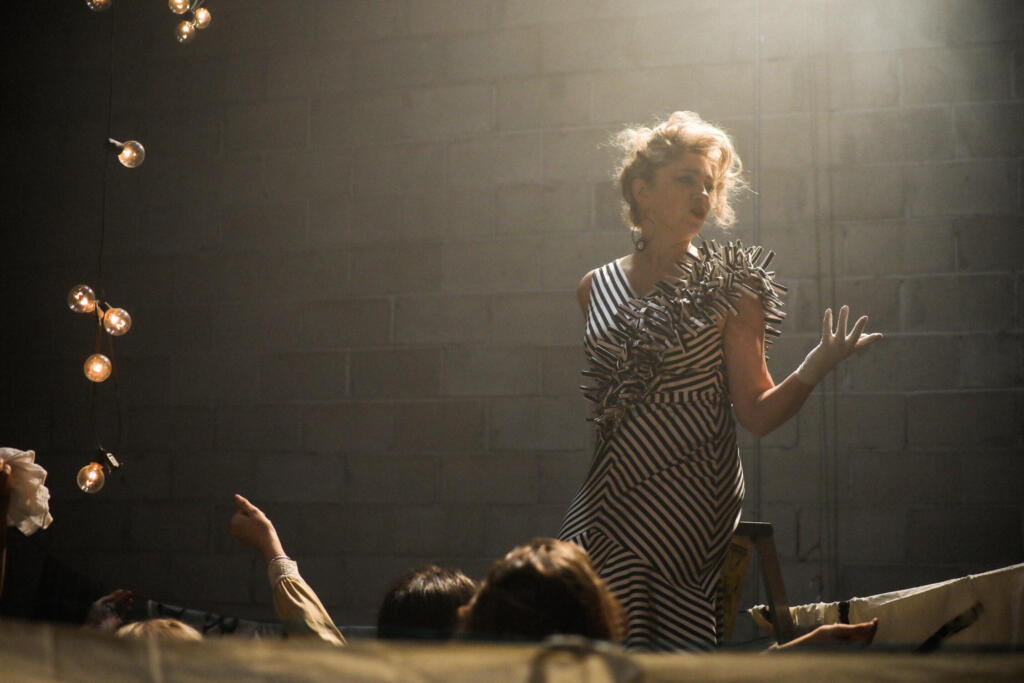
Lesya Verba in AnomalousCo’s “(beyond) Doomsday Scrolling.” PC: Jarrett Robertson
In that regard, massive kudos must be given to the dramaturgy of this project. Israeli Orian Assayag and Chinese Lu Li did remarkable work with the variety of story and language they were presented with; the devising within the cast themselves allowed a sense of organic necessity and vitality to coalesce. The audience never lost track of where they were going. With thirteen plus storylines, that is a feat.
The generosity of this cast cannot be overlooked, either. Twelve women shared the stories of their families, of themselves, of their heritage and identity. They looked us, as audience, in the eyes without fear or pretense. They surmounted what I can only imagine to be deep-seated generational trauma to allow us a look into the truth of war, displacement, pain, and resilience. There were numerous moments I found goosebumps shivering up my arms: Godi’s keening of “Ciao, Bella” as she’s taken to Wittzendorf; Kenny’s Gaelic kulning, her realization that “Because of them, I speak a language that is dead;” Mihailevschi’s teaching of screams, not silence; Wozniak’s cabaret hilarity dissolving into hysteria; the calm rushes of Zhdanova, the humor-as-coping-mechanism of Olivia-Garcia, the chanting of familial names from Edelstein. Whenever Verba, Kenny, and Edelstein found their voices and instrumentation weaving together. Whenever the remainder of the women joined in, stomping, reeling, dancing, laughing, crying.
It is difficult to describe an artpiece as complex, impactful, and necessary as this one. I cannot summarize with ease. But I can tell you that you must go see it. The more I let this experience percolate in my mind, the more I’m grateful for it, the more I want to act, the more I want to do.
(beyond) Doomsday Scrolling is phenomenal. And I haven’t even scratched the surface.
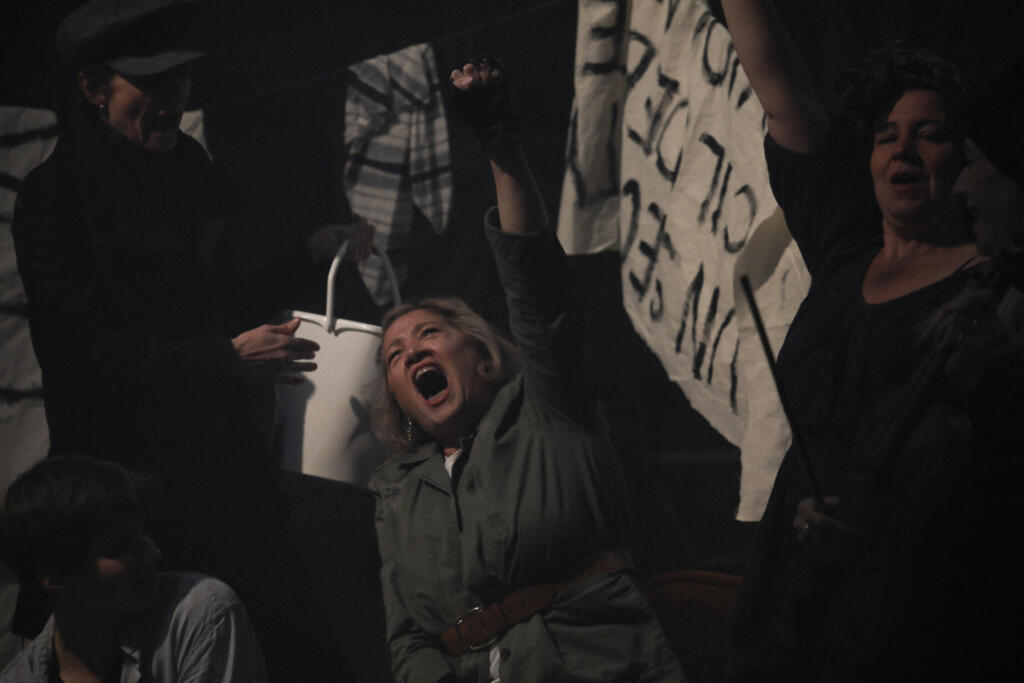
AnomalousCo’s “(beyond) Doomsday Scrolling.” PC: Jarrett Robertson
AnomalousCo’s (beyond) Doomsday Scrolling plays at HERE Arts from February 16th rhough February 26th. For tickets and more information, click here.
This post was written by the author in their personal capacity.The opinions expressed in this article are the author’s own and do not reflect the view of The Theatre Times, their staff or collaborators.
This post was written by Rhiannon Ling.
The views expressed here belong to the author and do not necessarily reflect our views and opinions.

